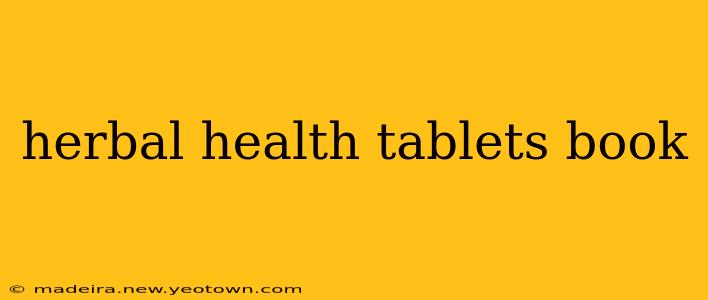The rustling pages of an old, leather-bound book… the scent of dried herbs… that’s the image that often comes to mind when we think of herbal remedies. While we may not always picture sleek, modern tablets, the truth is that herbal medicine has evolved, and now many potent herbal extracts are readily available in convenient tablet form. This journey explores the fascinating world of herbal health tablets, delving into their history, benefits, potential drawbacks, and what you need to know before incorporating them into your wellness routine.
What are Herbal Health Tablets?
Herbal health tablets are essentially concentrated forms of herbal extracts compressed into convenient, easy-to-swallow tablets. Unlike loose herbs or teas, they offer a precise dosage and a more consistent way to consume herbal remedies. The manufacturing process involves extracting the active compounds from plants – often through methods like water extraction, alcohol extraction, or supercritical CO2 extraction – then concentrating and formulating them into a tablet. This process ensures a standardized amount of the desired bioactive compounds in each tablet.
How are Herbal Health Tablets Made?
Extraction Methods: Different extraction techniques yield varying concentrations and compositions of active compounds. The choice of method depends largely on the specific herb and its desired constituents. Water extraction is a gentle method, preserving more water-soluble compounds, while alcohol extraction targets both water-soluble and fat-soluble components. Supercritical CO2 extraction is a more advanced method, offering high purity and selectivity.
Formulation and Compression: Once the extract is obtained, it’s combined with excipients – inactive ingredients that help bind the tablet, improve its flow properties during manufacturing, and sometimes add disintegration agents to aid digestion. The mixture is then compressed into tablets using specialized machinery.
What are the Benefits of Herbal Health Tablets?
Herbal health tablets offer several advantages over other forms of herbal medicine:
- Precise Dosage: Each tablet contains a consistent amount of the active herbal compounds, unlike teas or tinctures where the concentration can vary. This allows for better control over dosage and consistency of effects.
- Convenience: Tablets are easy to take, store, and transport, making them convenient for people with busy lifestyles.
- Improved Bioavailability: The extraction and formulation process can improve the bioavailability of certain herbal compounds, meaning your body absorbs and utilizes them more effectively.
- Longer Shelf Life: Compared to loose herbs, tablets typically have a longer shelf life, reducing spoilage and waste.
What are the Potential Drawbacks of Herbal Health Tablets?
While herbal health tablets offer convenience and precise dosing, it's crucial to be aware of potential downsides:
- Potential Interactions: Herbal supplements can interact with medications or other supplements. Always consult your doctor or a qualified healthcare professional before using herbal tablets, especially if you are on other medications.
- Quality Control: Not all herbal supplement manufacturers adhere to the same quality standards. Choose reputable brands that provide third-party testing and verification to ensure purity and potency.
- Side Effects: Even natural remedies can have side effects. Be aware of potential side effects and discontinue use if you experience any adverse reactions.
- Lack of Regulation: The regulatory framework for herbal supplements varies across countries. In many regions, they are not subject to the same rigorous testing and approval process as pharmaceuticals.
Are Herbal Health Tablets Safe?
The safety of herbal health tablets depends on several factors, including the quality of the product, the dosage, and individual health conditions. Choosing reputable brands with transparent labeling and third-party testing is paramount. Always consult a healthcare professional before taking any herbal supplement, especially if you have pre-existing health conditions or are taking other medications.
What are Some Popular Herbal Health Tablets?
Many different herbs are available in tablet form, each offering unique potential health benefits. Some popular examples include:
- Ginkgo Biloba: Often used to support cognitive function and memory.
- St. John's Wort: Traditionally used to alleviate mild to moderate depression.
- Echinacea: Known for its immune-supporting properties.
- Turmeric (Curcumin): Used for its anti-inflammatory and antioxidant benefits.
- Ashwagandha: An adaptogen often used to manage stress and promote relaxation.
Remember, this is not exhaustive and always consult a healthcare professional before taking any of these or other herbal health tablets.
Can I Make My Own Herbal Health Tablets?
While you can find recipes and instructions online for making your own herbal tablets at home, it’s generally not recommended unless you have extensive knowledge of herbalism and pharmaceutical manufacturing processes. Achieving the necessary consistency in dosage and ensuring the absence of contaminants is challenging without proper equipment and expertise.
This exploration into the world of herbal health tablets aims to provide a balanced and informed perspective. Remember, self-treating should be avoided, and professional advice is always recommended before starting any new supplement regimen. The information provided here should not be considered medical advice. Always consult with a qualified healthcare professional before incorporating herbal health tablets or any other supplements into your health and wellness plan.

